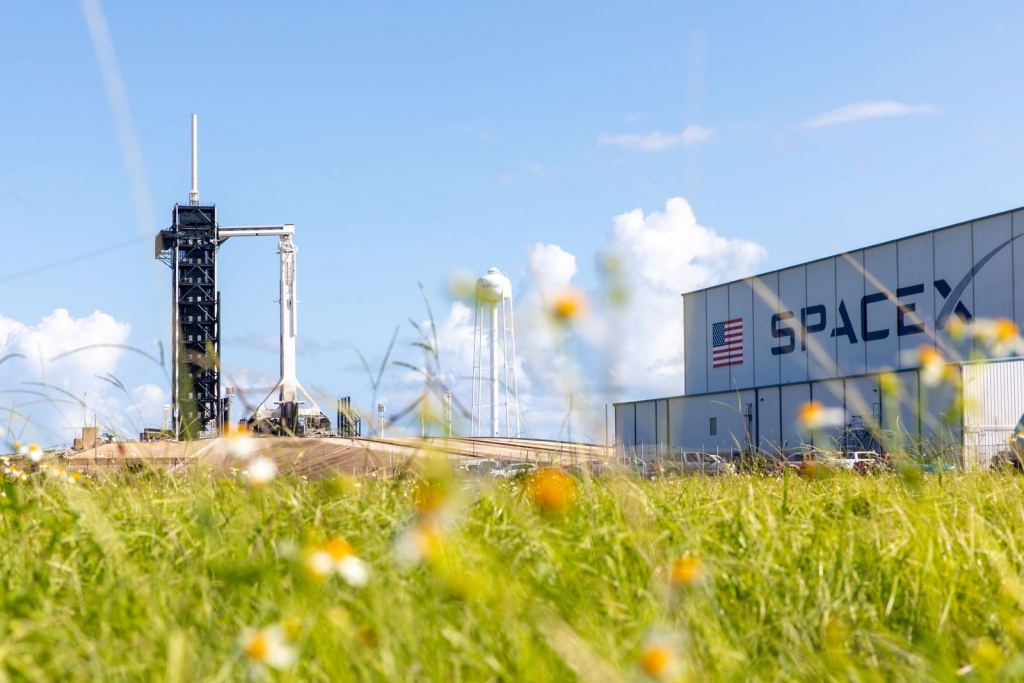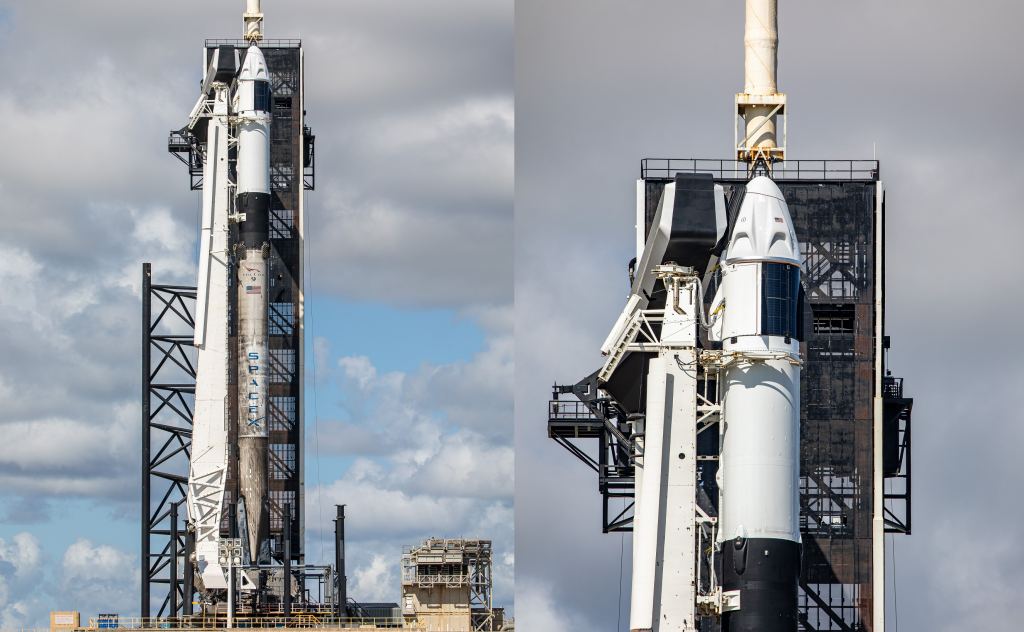On the evening of Wednesday, September 15th, history will be made as a crew of four commercial astronauts launch to orbit aboard the SpaceX Crew Dragon spacecraft Resilience. This flight will be operated by SpaceX, sponsored by Jared Isaacman (CEO of Shift4Payments) and represents the first all-civilian spaceflight in history. The launch will take place tonight at 08:00 PM EDT (05:00 PM PDT) from NASA’s Kennedy Space Center’s Launch Complex 39A.
The purpose of this mission is to raise awareness and funds for St. Jude Children’s Research Hospital, which specializes in the treatment of childhood cancers and pediatric diseases. At the same time, it demonstrates the accessibility of the modern space age, where civilians (and not just astronauts) can go to space. Universe Today’s own Alex Brock was on the scene to capture the pre-flight excitement, which was palatable!
Preparations for this mission reached the final stage as the crew members arrived in Florida last week (Thurs. Sept. 9th), where the spacecraft and rocket that will take them to space were also undergoing their final checks. The mission will launch from the historic Launch Complex 39A, where the Apollo and Space Shuttle missions also launched. The Resilience spacecraft also has a significant history, being the same vehicle used for the NASA-SpaceX Crew-1 mission.
 Launch Complex 39A at NASA’s Kennedy Space Center. Credit: Alex Brock
Launch Complex 39A at NASA’s Kennedy Space Center. Credit: Alex Brock
That mission effectively restored domestic launch capability to the US, something that it did not possess since the retirement of the Space Shuttle. Back in April, SpaceX conducted a second crewed mission that delivered astronauts to the ISS (the Crew-2 mission), once again using a Falcon 9 rocket and Crew Dragon spacecraft. Tonight, these launched-tested and crew-capable vehicles will be achieving another milestone as they transport a crew of entirely commercial astronauts to orbit.
This flight is also the latest in a series of spaceflights that have seen civilians earn their wings by flying to space. This past July, Richard Branson flew with a civilian crew aboard Virgin Galactic’s VSS Unity to the edge of space, which was followed nine days later by Jeff Bezos and three friends flying aboard Blue Origin’s New Shepard on its first crewed flight. However, these missions involved flights to the Kármán Line – 100 km (62 mi) above sea level – which is the official boundary of “space.”
In contrast, the Inspiration4 crew will fly to an apogee of 575 km (357 mi), placing them in Low Earth Orbit (LEO) where they will spend the next three days. During the flight, the crew will experience breathtaking views of Earth from space thanks to the nose-mounted cupola. This was a special addition for the Inspiration4 mission and was installed where the capsule’s front airlock usually sits, which allows it to dock with the International Space Station (ISS).
The spacecraft will also carry scientific equipment that will allow for microgravity research and experimentation while in orbit. After spending a total of three days in space, the Resilience will re-enter Earth’s atmosphere (scheduled to happen sometime on Sept. 19th). The spacecraft and crew will then splash down in the Atlantic Ocean off the coast of Florida, where they will be retrieved by the GO Navigator recovery vessel.
 The Falcon 9 rocket and Resilience spacecraft loaded on the launchpad (left), and a close-up of the Resilience spacecraft (right). Credit: Alex Brock
The Falcon 9 rocket and Resilience spacecraft loaded on the launchpad (left), and a close-up of the Resilience spacecraft (right). Credit: Alex Brock
In addition to Jared Isaacman, who is the mission’s benefactor, other crewmembers include Dr. Sian Proctor, a professor of geoscience, a science communicator, and analog astronaut; Hayley Arceneaux, a Physicians Assistant (PA) at St. Jude Children’s Research Hospital; and Chris Sembroski, an aeronautical engineer and a retired officer with the US Air Force. Together, they represent the mission ideals of Leadership, Prosperity, Hope, and Generosity, respectively.
All four crew members spent the past six months undergoing a rigorous training program in preparation for this flight. This included flying together aboard a series of parabolic flights (aka. zero-g flights) to accustom them to the feeling of being weightless, altitude training and team-building exercises (both of which involved climbing Mount Ranier), centrifuge training, Dragon simulations, observations of other launch operations, and additional classroom, simulation, and medical testing.
As expected, the build-up to launch has been a social media storm, where all of the participants, benefactors, and beneficiaries have been sharing their excitement and well-wishes in advance of the mission. “We’re getting ready for lift off alongside our friend @elonmusk who has changed his profile picture to the crew members of @inspiration4x! How are you showing your excitement?” tweeted St. Jude’s hospital.
“I’ve been waiting for this moment all my life. Thank you for all the well wishes & support. Let’s do this!” tweeted Dr. Proctor. In addition to being a well-respected academic and science communicator, Dr. Proctor’s father worked for NASA and she has completed four missions as an analog-astronaut, including the all-female Sensoria Mars 2020 and the NASA-funded four-month Mars mission at the Hawai’i Space Exploration Analog and Simulation (HI-SEAS) habitat in Hawaii.
“I want to thank everyone for all the support, encouragement, and love. And thank you to @stjude for being the reason I’m here today. This is for everyone who’s ever been through something difficult, and I know we all have. Hold onto hope because there WILL be better days,” tweeted Arceneaux. Arceneaux is a cancer survivor who was diagnosed with bone cancer by the doctors at St. Jude’s and recovered as a result of their treatment. Today, she is paying that forward working as a PA at the same hospital that oversaw her treatment!
Universe Today’s space photojournalist Alex Brock described (via telephone) what it was like to stand with the crowd that has descended on Launch Complex 39A in anticipation of the mission’s launch:
“It was really cool! I’ve shot several launches, like the uncrewed Demo-1, which was a pretty popular one in terms of people that turned out. This one certainly eclipses that. There are so many people out there. There is an incredible energy, it’s almost jovial, there is a levity to it. It felt like a celebration of the mission and the cause behind it.
“In terms of spaceflight, a lot of people have been talking about how this open the door to broader access to orbit. That’s certainly true. Sending four civilians up there on a commercial spacecraft for three days, there’s certainly something more relatable to the broader population. They’re just four everyday Americans, as opposed to military or science personnel
“It seems that this mission is much more relatable on a personal level. Personally, to me, it means a lot. It means so much more than I could ever describe. It’s really cool to think that this could lead to more everyday people having access to space.”
It’s an exciting time to be alive! Private benefactors and CEOs are sponsoring civilian spaceflight while simultaneously drawing attention and raising money for charitable causes. But of course, the dream is to get to the point where the cost of going to space is low enough that anyone can afford to go to space. It is for this purpose that the heavy-hitters in today’s commercial space industry were founded, and that dream is unfolded at a rapid pace!
The launch will be live broadcast as part of a Netflix documentary series (“Countdown: Inspiration4 Mission to Space“). Check out the trailer below, and be sure to set your reminders!
Further Reading: Inspiration4

